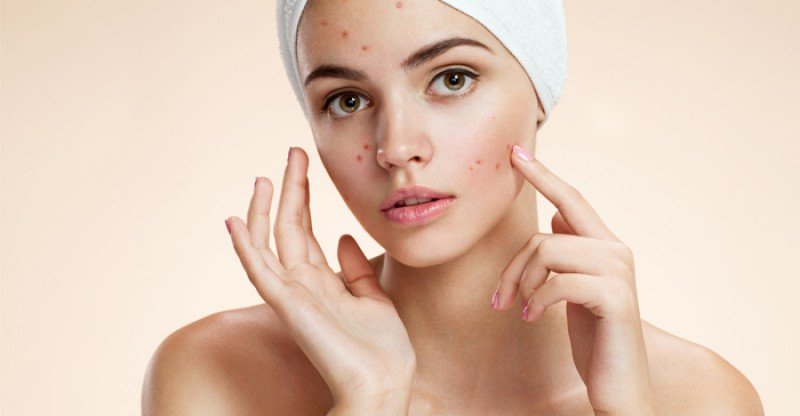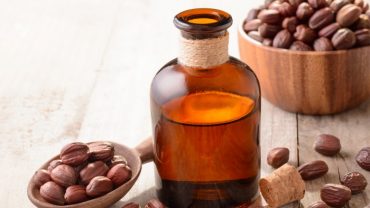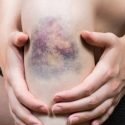13 Best Essential Oils for Acne and Pimples
As people experience life stressors and hormonal changes, they often suffer the effects of dreaded pimples returning.
If you are reading this, thinking that this is you at this moment, have we got news for you!
There are several essential oils that will naturally treat your acne, without having to visit a dermatologist or rub steroid creams into your skin.
What is Acne?
Acne occurs when hair follicles, which are attached to oil glands on your skin, are clogged.
Sebum, a substance that brings dead skin cells to the surface of your skin, is created in the glands.
When the follicles are clean and open, the process works as expected, and your skin is glowing and clear.
When they are clogged, however, the sebum cannot pass through and bacteria grow.
Once bacteria are present, the follicle swells and a pimple appears.
Depending on your cleanliness and facial-care routine, acne can appear and develop at any age.
Most people between the ages of 11-30 have experienced at least one acne breakout.
Types of Acne
There are several different types of acne, but one of the most common skin irritations are blackheads.
A blackhead happens when a pimple rises to the surface of the skin, creating a literal black head, or dark spot.
While it is most common for these to appear on the face, they can also appear on other body parts, such as your back.
Whiteheads are pimples that stay under the skin, create a sore bump, and contain a white substance, called pus.
The usual cause of whiteheads is dead skin cells, oil, or bacteria that block the hair follicle.
A cyst is a form of acne that can cause a scar if not treated properly.
These spots are typically very painful, located deep in the skin, and also contain pus.
Pustules are little blisters or pimples that contain pus.
They are red on the bottom with pus on top.
The one good characteristic of this type of acne is that it usually doesn’t last as long as other pimples or breakouts.
If you have ever noticed little pink-colored sensitive bumps, you probably have experienced papules.
These little bumps will usually look more like a rash than a breakout, and most times do not contain pus.
Nodules are solid and hard skin irritants that stay deep in the skin, often causing immense pain.
This abnormal bump needs to be treated primarily to relieve the pain since they are not on the skin’s surface and don’t really impact your physical appearance.
While there are numerous creams, face washes, and medications on the market for treating all forms of acne, you may find it more affordable and effective to use essential oils to rid your face of these blemishes.
Essential oils will help do the trick without any scarring, and may even help heal any existing scarring you might have.
Essential oil use for acne control also allows you to know exactly what you are putting on your face.
Medications and creams have a long list of ingredients, most of which are unfamiliar.
When you apply an essential oil or a combination of oils (for which we will share some go-to recipes later in this article), you know exactly what you are putting on your skin.
If you are prone to allergic reactions, especially when using facial products, essential oil usage might be the answer for you.
A decreased use of chemicals on your skin will cause less discomfort and reaction.
Essential oils are also an extremely convenient way to treat sores and blemishes.
With the rising popularity of oils, most people might already have some of the suggested oils for other reasons or uses in their homes.
Adding some oil to your face cleaning routine may be easier than you think, with benefits that exceed those of using a topical acne treatment regime prescribed by a dermatologist or healthcare professional.
Best Essential Oils for Acne
The process of finding an oil or combination of oils that is right for you may take some time, but once you have discovered it/them, clear skin will soon appear.
Essential oil for pimples is a natural way to treat a frustrating issue many of us deal with from time to time.
Skin sensitivity, skin type, and the type of acne present must all be taken into consideration before choosing an essential oil regime.
Read below to discover the most popular oils, and how to use them to treat your unwanted pimples and blemishes.
Please note that a carrier oil is needed when applying these oils to your skin.
Never apply the oil(s) directly to the affected areas unless otherwise recommended.
Mixing equal parts of oil and carrier oil is suggested.
Lavender Oil
Lavender oil is popular to use on your inflamed skin, due to its calming effects that provide you with instant relief and smoother, softer skin.
In 2013, a scientific experiment studied the reason for lavender’s effectiveness on skin irritation.
Studies showed that lavender can slow or stop bacterial growth.
Once the bacteria are eliminated from a follicle, it is able to heal and work properly again, and your skin is left glowing.
Another benefit of using lavender is that it not only calms the skin but can also reduce your stress and anxiety about your breakouts.
Lavender has been known to encourage better sleep, which will, in turn, nurture a healthier lifestyle and more-radiant skin.
The suggested use of lavender oil is as follows:
- Take 5 drops of oil and mix with 1 teaspoon of witch hazel.
- Blend the two by shaking, and apply the mixture with a clean cloth to your irritated areas.
- Let the mixture dry, or it will not be as effective.
The treatment may be used up to 3 times a day to cure blemishes.
If you are trying to remove scars, directly place 2-3 drops on the irritated area and rub in with your finger.
This method may be repeated 3 times daily for a duration of 3 days.
Juniper Oil
Juniper berry oil is used to fight the bacteria that lead to acne.
When applied to the skin, this oil may create a warm feeling, often noted by users to help relieve the pain or soreness associated with breakouts.
The oil provides antibacterial and antimicrobial benefits that help to heal skin blemishes.
With detoxifying elements and added stress-relief capabilities, juniper berry oil will leave your face looking flawless in no time.
Grapefruit Oil
While providing a fresh, delightful fragrance, grapefruit oil also has antibacterial qualities that make it desirable when combating acne.
Grapefruit oil is highly popular in recipes of acne-treating oils.
It can be used to heal not only blemishes on the skin, sores deep in the skin, and scarring caused by acne, but also other skin wounds such as a scraped knee.
Grapefruit oil is an active ingredient in leading cellulite treatment lotions.
With the ability to promote smooth skin and an aroma that arouses the senses, grapefruit oil is highly sought-after.
Melaleuca Oil
Melaleuca oil, also known as tea tree oil, has been shown to reduce greatly the number of pimples after 45 days of use.
As it is one of the most popular oils for acne prevention and treatment, it is important to note its ability to minimize your clogged pores.
Another beneficial side effect of using melaleuca oil is that it does not cause any adverse side effects or make you more likely to become immune to the bacteria that cause acne.
It is recommended to apply melaleuca oil with a cotton ball directly to the problem spot(s).
With most oils, a little bit goes a long way; only 2-3 drops, in this case, are necessary.
Another option is to add the same amount (2-3 drops) to your already-established face or body wash regime or add it to a spray bottle of water to spray all over your body and face.
Tea tree oil may dry out your skin if you apply too much, so be sure to continue your use of daily moisturizer when using this oil.
Lemon Oil
Another antibacterial oil that will help reduce the appearance of skin irritation is lemon oil.
Studies have shown that the most common types of bacteria are prevented from growing and almost entirely eliminated by the use of lemon oil.
If you are dealing with whiteheads or other blemishes under the skin, apply the oil directly to the spot.
Lemon oil can cause your skin to burn if applied to an open blemish or wound, so use with caution.
When used as an exfoliant, lemon oil can help reduce acne scarring, leaving your skin smooth and healthy.
Lemon oil has an added benefit of helping to restore dull or tired-looking skin.
If you suffer from excess oil on your face, using lemon oil might be helpful, as it works to reduce the amount of oil on your body.
Lemon oil is most commonly used when creating homemade cleaning products, so it should be no surprise that the use of this oil will help to clear your skin and you to achieve a healthy glow.
Lemongrass Oil
While most oils are used for acne treatment, it is important to incorporate them for acne prevention, as well.
This oil is best used in a facial steam, with the ability to reduce the bacteria that might be living in your pores.
If you have a painful pimple or sore, try applying lemongrass oil for relief, and enjoy the anti-inflammatory bonus.
As with lemon oil, when trying to clear up acne, lemongrass can help reduce the amount of excess oil on your skin.
Mixing a few drops with warm water in a spray bottle is suggested to help speed up the process of fighting unwanted breakouts, as well as preventing future pimples from appearing.
Lemongrass oil is one of the most-desired essential oils for acne.
Rosemary Oil
Rosemary oil is most commonly-known for treating cystic acne.
Due to the high pain levels a cystic spot causes, the components of rosemary oil help relieve pain associated with those pesky under-the-skin growths.
Rosemary is known as a great antioxidant and antimicrobial oil.
Rosemary is a wonderful go-to option for an essential oil for pimples and acne treatment.
This oil’s properties include anti-inflammatory elements that help minimize the swelling or puffiness associated with zits and pimples.
Using this oil will help you achieve glowing skin, and will leave a fresh, clean scent.
Oregano Oil
Oregano oil is usually associated with Italian food, but it has a main ingredient called carvacrol that plays a powerful role in acne treatment.
This key ingredient is known to have antimicrobial effects that assist in breaking down the walls around fatty acids.
In order for bacteria to grow, they must maintain that wall around their fatty acids.
Oregano oil, because it contains carvacrol, eliminates the most necessary element for bacteria to grow, thus killing them.
Using this oil will keep your pores free from bacteria.
Due to the high concentration of this oil, it is suggested to be used as follows:
- Blend an equal amount of oregano and either jojoba or almond carrier oil.
- Before going to sleep at night, gently massage the mixture into the blemished area.
Applying the concentrated oil directly to the blemish may cause further irritation to the area.
Geranium Oil
Geranium oil is one of the most commonly-used oils to reduce the development and spread of bacteria.
Geranium is used in several anti-inflammatory drugs, thus making it a great option when choosing essential oils for pimples.
Pustules and other blemishes containing pus are commonly treated with geranium oil to help reduce swelling and pain.
Peppermint Oil
One of the most pleasant side effects of peppermint oil use is its minty, refreshing scent.
Using peppermint oil can help prevent the growth of several types of bacteria, and it is suggested to use for both spot healing and acne prevention.
Adding a few drops of peppermint oil to an unscented lotion for daily use is suggested.
For treating a spot, apply some oil to a cotton swab and dab directly on the blemish.
Eucalyptus Oil
Eucalyptus oil is one of the best essential oils for acne.
Eucalyptus is another oil with antibacterial properties that is safe for daily use.
Mixing 2-3 drops of eucalyptus oil with your daily moisturizer may be helpful in preventing facial imperfections.
When using this oil, be careful to avoid your eyes, nose, and any open wounds, as the oil may cause a burning sensation.
It has a very strong scent and is best when diluted with water, a carrier oil, or mixed in with your existing face wash or moisturizer.
Direct application is not recommended.
Frankincense Oil
The use of frankincense oil goes back several years; however, recent studies have shown that when combined with other oils, frankincense is very helpful in treating acne.
With antibacterial and anti-inflammatory properties, frankincense oil can help heal minor acne blemishes and leave your skin feeling moisturized and refreshed.
Essential Oils for Acne Recipes
While all of these oils are beneficial to use individually, it is important to note that specific combinations of them can help heal your unwanted blemishes quicker, as they work together to achieve specific goals.
For individual use, each can be applied using 2-3 drops of oil to a carrier oil, and with a cotton swab directly dab onto the affected area.
If burning, itching, or irritation occurs, stop use immediately.
Finding the right combination of oils may be the trickiest part for you.
We suggest that you choose a recipe that works for the type of blemish you are trying to remove, as well as one that sounds appealing to you.
Anytime you mix oils, remember to use a carrier oil such as jojoba or almond oil.
Unless suggested by the oil or recipe, always dilute oils with a carrier oil before applying.
The carrier oil does not further block your pores, but it simply dilutes the essential oil to protect your skin.
Simple Recipe for Acne
For treating papules, pustules, and whiteheads:
- Blend 7 drops melaleuca oil, 3 drops frankincense oil, and 3 drops grapefruit oil with 15 drops of carrier oil (jojoba or almond).
- Apply to the irritated area using a cotton swab; repeat up to twice daily.
- Massage into the skin, unless the blemish is sore.
For treating blackheads, mix equal amounts of melaleuca and a carrier oil and apply daily to the affected area.
Essential Oil Face Wash for Acne
- Mix 1 tablespoon coconut oil, 3 tablespoons honey, 1 tablespoon apple cider vinegar, 20 drops melaleuca oil, and 2 capsules of live probiotics using a hand blender.
- Pour into a bottle and store in a cool environment.
- Safe for use daily.
Essential Oil Acne Scar Treatment
- Make a paste by blending 2 teaspoons raw honey, 3 drops lavender oil, 3 drops melaleuca oil, and 3 drops frankincense oil.
- Apply to face, let sit for 45 minutes to an hour, and rinse with warm water.
Precautions
When using essential oils, it is important to remember that you are choosing a healthy and natural way to treat your skin problems.
However, you need not overdo it and be cognizant of the fact that a little bit can go a long way.
In most situations 2-3 drops of oil are plenty.
If you have sensitive skin, remember always to use a carrier oil before applying oil directly to your skin.
The carrier oil will dilute the mixture, making it less harsh on the blemishes and acne-prone areas.
When using essential oils to treat skin problems, avoid extended periods of direct sunlight.
The UV rays can cause redness, and can further irritate your skin.
If when using an oil you notice further breakouts or burning, stop using that oil immediately.
It is recommended that you use all oils individually before combining into mixtures so that you are aware of the root cause if any allergic reactions arise.
Lavender is typically considered safe, and a great place to start when determining which oils to use for acne treatment.
If you are pregnant or nursing, contact your doctor before using any essential oils in your daily routine.
FDA Compliance
The information on this website has not been evaluated by the Food & Drug Administration or any other medical body. We do not aim to diagnose, treat, cure or prevent any illness or disease. Information is shared for educational purposes only. You must consult your doctor before acting on any content on this website, especially if you are pregnant, nursing, taking medication, or have a medical condition.
HOW WOULD YOU RATE THIS ARTICLE?






